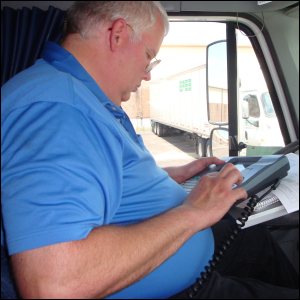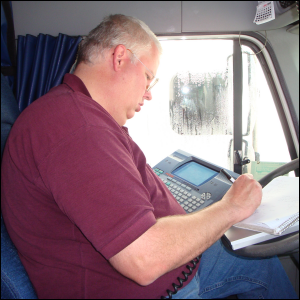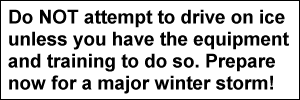In the title, we made a bold statement about a professional truck driver’s driver manager or fleet manager being the key to his or her paycheck.
 This statement has been based on our personal experience as
This statement has been based on our personal experience as
- a husband-and-wife professional truck driving team doing transcontinental driving and
- Mike’s work as a regional truck driver and local truck driver.
Control of the size of a trucker’s paycheck applies to those who are paid on a per-mile basis and those who are paid on an hourly rate.
Consider:
- The fewer miles or hours for which you are paid, the smaller your paycheck will be.
- The more miles or more hours for which you are paid (within your Hours of Service limitation), the larger your paycheck will be.
Mike also knows that paycheck caps can apply even to those driver trainers who are paid for the miles they drive and not just for training truck driver trainees.
So, with that being said, let us pursue this subject.
Terminology
First, what is the difference between a “driver manager” and a “fleet manager”? There is probably no difference in duties depending on which trucking company you ask.
Some trucking companies may require their managers to do a variety of tasks like
- sending out load assignments (or dispatches) and
- referring driver-described customer problems with loads to the company’s internal customer service representatives.
Larger companies may have a separate “break down” department when trucks need repair on the road.
 Driver managers are often far more than just “dispatchers.” There are other occupations where folks are sent out by dispatchers like police officers, firefighters and ambulance crews.
Driver managers are often far more than just “dispatchers.” There are other occupations where folks are sent out by dispatchers like police officers, firefighters and ambulance crews.
We believe that within trucking companies, the difference between driver managers and fleet managers boils down to semantics and aesthetics.
Many drivers would prefer for someone to go to bat for them personally and individually (focusing on the driver) as opposed to being considered just part of a larger fleet.
We know that “high maintenance” drivers — those who require a lot of “care” or handling — take much more of a manager’s time than “low maintenance” drivers who rarely call on their managers unless there is truly a need or crisis.
Depending on the way a trucking company is organized, a manager may be in charge of a pretty large group of drivers scattered all over a large territory.
His or her job is to “juggle” all of these drivers skillfully, so that none of them “falls through the crack.”
Some companies put “fleet managers” in charge of several driver managers.
Relationships Between Drivers and Their Managers
 The relationship that a driver has with his/her driver manager is only part of the equation when it comes to getting a good paycheck.
The relationship that a driver has with his/her driver manager is only part of the equation when it comes to getting a good paycheck.
Another is how “aggressive” the manager is on behalf of his/her drivers, sometimes with respect to getting drivers miles.
Managers sometimes have to smooth ruffled feathers when drivers run up against unwritten company rules that a driver didn’t know about.
For example, Mike once worked for a company that paid a “performance bonus” on miles run beyond a certain pre-set limit per month.
When Mike worked OTR, his philosophy was to take any load offered to him. Short runs could lead to long runs, so he took them all.(1)
One month, he had run fairly well all month long. He needed just one more load before the month ended to put him over the top on earning a performance bonus.
He got to the receiver and sent the “Arrived at Receiver” message before midnight. Hurray!
He thought his performance bonus — giving him an extra 2 cents per mile for ALL of the miles he ran that month — was secure.
However, when the time came that the bonus should have been paid, it wasn’t!
Why?
Well, although Mike had arrived at the receiver before midnight, he didn’t “empty out” until after midnight.
The difference “cheated” him out of his bonus that month.
You can well imagine Mike’s frustration.
He had done everything possible on his end to earn the bonus only to have it snatched away at the moment of possession.
He talked with his driver manager and asked if there was anything that could be done. Unfortunately, no there was not.
The rule — unwritten though it was — was firm.
Mike had a very good relationship with this driver manager.
So when Mike told him, “Don’t you do this to me again. Do you understand me?” the driver manager replied, “Yes sir.”
Some driver managers would not have taken Mike’s wording and tone of voice very well, but this one did — and the situation described never happened again.
As if to make up for the lost bonus from the previous month, Mike’s driver manager gave him an abundance of miles the next month!
In fact, until the company did away with performance bonuses, Mike always had more than enough miles during the month to earn one.
Our Personal Experience
During Mike’s last regional truck driving job, he had a number of driver managers, each one with his own unique style.
- Mike got along well with one manager, but this guy just didn’t ever give Mike the long runs he requested when running over working weekends. Mike had heard through the grapevine that other drivers in the company were getting these long runs, so why didn’t he?
Too often, Mike would empty out at a receiver on Monday but not get another load assignment or pick-up appointment until Tuesday. Sure, he got “layover pay,” but what was that compared to getting a 400 mile run? We’ll look at that in-depth below. - When Mike was a driver trainer, he was automatically put in the fleet of a driver manager with whom he often did not see “eye-to-eye.” This was partially the reason why Mike didn’t stay as a trainer for very long with that company. Mike was surprised that this manager was put in charge of the training fleet because of his personality and the way he ran his “board.”
- Mike had one really excellent driver manager with whom he got along exceedingly well. In fact, it was while Mike was on this manager’s board that he was able to get home every weekend for a while to teach a special class on Sunday afternoons. This was very important to Mike and this manager worked to make it happen for him on the inside. It was this kind of cooperation that motivated Mike to go above and beyond the call of duty as a driver.
Relationship Snags That Turn Financial
Vicki’s mom often cited an age-old cliché, “It takes two to tango.”
In other words, both people in a relationship need to work to make it flourish.
In the case of professional truck drivers and their driver managers or fleet managers, neither is independent of the other.
- Those on the inside — managers included — work to book and assign the loads that need to be moved.
- Truckers work to move the loads that have been booked.
Yes, some folks have a coarse demeanor, crude habits or are generally hard to get along with. This applies to both truckers and their managers.
However, while drivers do not hold the strings of their managers’ paychecks, managers do hold the strings on drivers’ paychecks.
Many a professional truck driver has experienced financial backlash (punishment) from a manager who tried to “teach that driver a lesson.” (The driver could have had a bad attitude at one point.)
Drivers can literally be “squeezed out” or “starved out.”
It’s bad enough when a driver has a choice to go looking for a job elsewhere.
It’s altogether a different thing when a driver is locked into a bad situation and is being exploited!
Personality Styles and Differences
 It helps immensely if your driver manager has experience driving a commercial motor vehicle for a living.
It helps immensely if your driver manager has experience driving a commercial motor vehicle for a living.
That way, he or she can identify with the drivers in the struggles they have on the road.
But that is not always possible.
Some driver managers and the drivers they manage have huge personality clashes — differences in style, so to speak — and different ways of doing things.
When we drove for U.S. Xpress, we were reassigned to the fleet of a driver manager whose style we did not like.
We attempted to work with this new manager but it seemed he did not want to learn our style or how we operated.
After trying for some time to get along with this person — and hitting a brick wall with each encounter — we asked to be put back with our old fleet manager with whom we got along very well.
However, our request was refused.
What could we do?
We had planned to leave the company before the next winter driving season because they used traffic lanes that ran through a lot of northern states.
Being from the south, we didn’t like running in snow and ice.
In looking at the calendar, we knew that our one year anniversary with the company was in early August.
The “mandatory reassignment” to this new manager prompted us to work just long enough to secure our vacation pay for the year.
Yes, we left the company earlier than we had planned, but the relief of not having to deal with that hard-to-get-along-with driver manager was worth it to us.
Perhaps the company should have read an article like this June 2012 article on driver retention.
Your Choices
 What can you do if you have a personality clash with your driver manager?
What can you do if you have a personality clash with your driver manager?
You need to know your trucking company’s policy about “open door management.”
See if you can arrange some face-to-face time with the manager to iron out problems.
Although it may be tempting, don’t be content to limit your communication strictly
- on the QualComm (in written form, the tone of which can be misinterpreted) or
- on the phone (where you can’t see the other persons’s facial expressions).
If at all possible, get by your home terminal to talk with your manager during the hours he/she will be there.
Before the meeting, write down in advance what you want to cover during your meeting such as:
- one or two examples of problems you have had;
- expressing your desire for both of you to work together to solve problems like this; and
- getting your manager’s input and feedback to see how these things can be resolved so that everyone (driver, manager and company) benefits.
If you cannot achieve success directly with your driver manager, investigate going over the manager’s head to his/her supervisor.
Mike did this once.
In fact, once Mike decided not to train any more, he was still left on the fleet of the manager with whom he didn’t get along well.
He appealed to the manager’s supervisor who timed Mike’s transfer to a different manager when the training fleet manager was gone on vacation.
In so doing, there was no confrontation and things went smoothly.
Company Internal Changes
The last regional trucking company for whom Mike worked had built a reputation on getting drivers within their hiring area home every week. Repeat: “every week.”
 When the recession began in 2008, the company began to make changes, stating that drivers who lived farther away from the headquarters would have to stay out over some weekends.
When the recession began in 2008, the company began to make changes, stating that drivers who lived farther away from the headquarters would have to stay out over some weekends.
Mike didn’t like being away from home that long, but when Vicki started riding with him full-time it became much easier for him emotionally.
Mike figured that as long as he was going to be “out on the road” for up to two weeks at a time, he wanted to be utilized.
It made sense: If the company was going to keep him out on the road over the weekend, they should put him to work within his Hours of Service allowance.
But for some reason, he didn’t get utilized as much as he wanted to be.
His manager was “nice enough,” just not “aggressive enough” to get Mike the over-weekend miles he wanted.
In hindsight, we realize how costly this was.
The Cost of a Driver Manager Who Won’t Utilize a Driver
Let’s examine the cost of Mike getting layover pay instead of, say, a 400-mile trip.
- Layover pay: $50
- Mileage pay: $0.37 per mile * 400 miles = $148
So being laid over one night cost $148 – $50 = $98.
If this happened once a month, the annual cost was:
- $98 * 12 = $1,176.
Of course, you can substitute your own numbers to find out your own sacrifice.
The thing that was maddening was that when Vicki was riding with Mike the last time, she was using a laptop computer with a mobile broadband connection to the Internet.
She could access various online load boards, which clearly showed loads in the area that needed to be covered!
So it wasn’t as though there was a lack of freight.
Had Mike stayed with that company, he would have requested a change to another fleet or board so that he could get longer miles over the weekends away from home.
Too Many Miles, Too Many Loads, Wrong Kind of Runs
 While we have concentrated on the “lack” of miles and hours that we have experienced, we also know what it is like to be pushed into taking more loads than we wanted or the wrong kind of runs.
While we have concentrated on the “lack” of miles and hours that we have experienced, we also know what it is like to be pushed into taking more loads than we wanted or the wrong kind of runs.
Once when we teamed for Swift, we were forced to run the east coast for 5 weeks.
It was very difficult on us physically because we had a lot of shorter runs and couldn’t get good sleep.
We eventually found out that we had unknowingly been kicked off the “transcontinental [TransCon] team” by someone who had been instructed to manipulate the numbers by removing teams from the fleet when they were on time off!
It made the statistics look good on the inside but was really unfair to teams that had no idea of what was happening.
Once we knew about this, any time we came back from time off, we asked to be put back on the TransCon team.
This helped, but it sure would have been better had we known that before that most vexing 5-week ordeal.
Mike also had a situation as a solo driver when for better than a week, his driver manager kept giving him runs going up and down I-95 in the heavily tolled northeast.
This was very tiring to him.
So, he asked for a break off that routine and was eventually given other runs.
Are Drivers a Dime a Dozen?
 There is an old saying that “drivers are a dime a dozen.” Well, no, they’re not!
There is an old saying that “drivers are a dime a dozen.” Well, no, they’re not!
For more years than not, the trucking industry has supposedly been dealing with a driver shortage.
More and more drivers are leaving the trucking industry and not coming back.
When we left team driving in 1995, Vicki never again drove professionally.
She has served as Mike’s home support team both at home and in-truck since then.
Being a home support team member is not a job with pay attached, but the work makes things easier for drivers who are out on the road during their tours of duty.
Many times over the years, Vicki has let Mike “vent” his frustration over difficulties he has had with driver managers.
After listening patiently, she usually ends up asking him questions about this or that and giving Mike advice on what to do or say next, if anything. Sometimes, perspective really matters.
Some companies treat their drivers like “raw meat.” This is wrong.
While you deserve respect just for being a human being, you deserve extra respect for having received training to be a professional truck driver.
That is, you deserve to be treated like the trained professional you are!
Don’t let the fact that there is a dispatch window separating you from your driver manager make you feel small.
Do not feel bullied or pressured into doing something that breaks the law or is unsafe.
As someone famous once said, “No one can make you feel inferior without your consent.”
On our snow chains page, we detail the account of professional truck driver, Cynthia Ferguson, who was first wrongfully terminated for shutting down her truck in bad winter weather and then totally vindicated under the law.
The trucking company that fired her had to pay up for their actions.
Section 405 of the Surface Transportation Assistance Act of 1982 “prohibits trucking companies from firing drivers for refusing to drive in violation of commercial vehicle safety regulations.”
Working on the Same Team
 Remember: Both a driver and his/her driver manager are working on the same team.
Remember: Both a driver and his/her driver manager are working on the same team.
They’re just in charge of different parts of the process of delivering freight.
Neither of them can do the other one’s job — or do without the other.
For example, if there is a problem that can only be handled “on the inside,” then the driver doesn’t have to spend his/her time trying to resolve that.
Also, for many drivers, their managers are the ones who are lining up future loads for them.
Some companies attempt “pre-planning” to let the drivers know what load is coming up next so that they can plan where to fuel, where to get a shower, where they will park, when to eat, etc.
Utilization
Along the same lines as the layover example above is the utilization factor.
The higher a driver’s utilization is, the better off everyone will be.
More loads will be covered and drivers can look forward to good paychecks.
If a driver can run 450 miles per day but is assigned loads that have him running only 350 miles per day, that 100-mile-per-day difference hurts.
Let’s calculate that for a driver earning 30 cents per mile (2 weeks of vacation not being counted toward the total):
- 100 miles/day * $0.30 = $30 per day
- $30 per day * 6 days per week = $180 per week
- $180 per week * 50 weeks per year = $9,360 per year!
That is substantial.
Time: For What Are You Exchanging It?
In some jobs, you can leverage your time and have multiple things going on at once, all of which are working together to help you earn a paycheck.
Most professional truck drivers do not have that luxury.
They have to exchange their time — never to be recovered or “done over” — for getting freight down the road.
As long as you’re going to be out on the road as a professional truck driver, we encourage you to make the most of your time.
![]() Money saving tip: We recommend that you become your own advocate when it comes to getting as many miles or as many hours as possible.
Money saving tip: We recommend that you become your own advocate when it comes to getting as many miles or as many hours as possible.
Work with your driver manager to achieve this. Find points of commonality on which you can agree and go from there.
There were times when Mike emptied out after his regular driver manager went home, at which time the night dispatcher came on duty.
Occasionally, this dispatcher contacted Mike and asked him to do “a favor” and cover a load that Mike had the hours to run.
Mike never liked driving late at night, but to help out the company and the night dispatcher, he pulled a few of these all-nighters.
Later on, when Mike needed miles after hours, he sent a note to the night dispatcher to get him a long run.
The night dispatcher — remembering the favor Mike did for him — was more than accommodating and usually ended up giving Mike his choice of runs! Sweet!
Remember:
- The lower your utilization, the lower your paycheck will be, and hence the lower your savings will be.
- The higher your utilization, the higher your paychecks will be and hence the higher your savings can be.
Return from Your Driver Manager or Fleet Manager is the Key to Your Paycheck to our Truck Driving Jobs page or our Truck Drivers Money Saving Tips home page.
Reference
1. In January 2010, Vicki found an article stating that electronic media from computers and cell phones can be copied by agents at border crossings. For this reason, Mike declined from that point on to take any loads to Canada.
sovereignsociety.com/2010/01/18/sovereign-canadian-customs-wants-your-laptop-too%E2%80%A6/ (no longer online)









